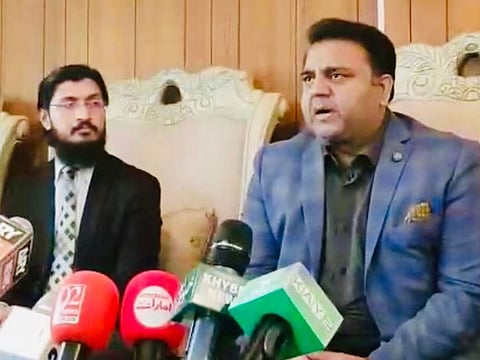Narendra Modi or Rahul Gandhi, Pakistan is open to talks with anyone: Fawad Chaudhry
Pakistan will resume peace overtures with India after polls when political flux subsides

Also In This Package
Dubai: Pakistan will try to resume peace talks with India once elections are results are out and the political flux there subsides.
“We have delayed our efforts to hold talks with India because we do not expect any big decision from the present Indian leadership,” said Fawad Chaudhry, Minister of Information of Pakistan.
He told Gulf News in an interview on Sunday that it is not the right time to hold a dialogue as Indian politics is currently in turmoil because of the upcoming elections. “It is useless to talk to them (India) now unless there is some stability. We will move forward once the new government is formed after the elections,” he said.
We will respect any Indian leader and the party elected by the Indian people. And, we would like to move forward to hold dialogue with whosoever comes into power in India.Fawad Chaudhry
Pakistan Prime Minister Imran Khan has invited India on a number of occasions, including during his acceptance speech, for talks to make peace after winning the elections, but there has been no major response from the nuclear-powered-neighbour.
Chaudhry said the opening of the Kartarpur Corridor between India and Pakistan in November last year is a remarkable development between the two countries because it will not only help the Sikh community but also benefit the Indo-Pak relations.
Chaudhry spoke on a wide range of topics covering Afghan peace talks, relations with the US, Pakistan’s role in the regional peace and his country’s relations with countries in the Middle East.
When asked which Indian leader will suit Pakistan more when it comes to peace talks — Narendra Modi or Rahul Gandhi , the minister said it does not matter for Pakistan. “We will respect any Indian leader and the party elected by the Indian people. And, we would like to move forward to hold dialogue with whosoever comes into power in India,” he said.
Calling the shots
On being asked who calls the shots in Pakistan when it comes to foreign policy – the army or the civilian government, Chaudhry said sternly: “Of course Prime Minister Imran Khan.”
“During the earlier regimes, there had been conflicts between the civilian government and the army on various issues as they were not capable of talking to each other frankly. But this is the not the case anymore since Imran Khan has come into power,” he said.
“Our government has an advantage that we can talks freely with each other. Currently, each and every major policy in Pakistan is actually a consensus policy – with the civilian government and the army on the same page,” he explained.
Afghan peace dialogue
Chaudhry said Pakistan is playing its role at a fairly advanced level for the Afghan peace dialogue. “Frankly, we expect a positive outcome from the negotiations between the US and Afghan Taliban,” he said.
The Information Minister said Pakistan’s role in bringing Taliban to the negotiation table has been appreciated by US President Donald Trump so much so that he has reviewed and changed his policies against Pakistan.
According to reports, the US may offer Pakistan a free trade agreement (FTA) in return for its assistance in ending the Afghan war. During a recent visit to Pakistan, US Senator Lindsey Graham is believed to have discussed the idea with Pakistani officials.
“I know about the FTA offer but cannot comment on this at this stage,” said Chaudhry
Chaudhry said stability and peace in Afghanistan is not just in the US’ interests but Pakistan will also greatly benefit from this.
Imran, Trump meeting
The Minister said the meeting between Imran Khan and Trump is on the cards but it will be possible only after the Afghan peace talks. “We are waiting to see this happen,” he added.
Pakistan’s role in the Middle East
During the last decade or so, Chaudhry noted that Pakistan had become irrelevant to the Middle East for the earlier governments isolated the country.
“Soon after coming into power, Prime Minister Imran has reviewed the policies and we have worked on improving relations with Saudi Arabia and the UAE. Imran visited both the countries on his first official visit and talked to the leadership at length,” he said.
He said Pakistan has special strategic relations with Saudi Arabia and the UAE. “Our relations become even more important as the largest number of Pakistani expatriates are working in these two countries.”
Sign up for the Daily Briefing
Get the latest news and updates straight to your inbox




